- Home
- Virginia Hamilton
Arilla Sun Down Page 6
Arilla Sun Down Read online
Page 6
Jack-Run has arranged the chairs facing the room, backs to the mirror, like we are going to have a show. Well, I don’t mind. The girls are all excited and not even looking bored. Settling down and acting like young women. Because Sun is now standing so still right next to them and not looking at them. He is at attention in his war bonnet and make-up. And taking them and all of us to a time when many warriors stood that way on flat land, or sat so still on horseback — for hours watching, waiting for buffalo or even war.
He is standing high on a rise watching the sun go down. I have seen it done like that in Cheyenne Autumn, but Sun is better than any actor in a movie. He may look like a put-on, but he is for-real feeling it.
Sun crouches and rests his wrists on one knee. Tracking man or animal until the feeling and the mood fade out of him.
The way he can capture us and turn us loose when he wants to. He looks out into the studio and we follow his gaze.
My mom standing there in a black leotard and with the white paint on her face. She takes a walking pose with toes turned out. She jerks from left to right. Her hands flutter together from side to side. We clap in time with the silent flutter. Her hands and arms outline the shape of a large crate at her side. She struggles to lift the crate by one corner and staggers with it down the room to almost drop it on her toe before she sets it down.
My Birthday girls laugh. Sun laughs. I’m sitting with my mouth open and I didn’t even know it. I swear, I can almost see the crate that isn’t there, and how it almost broke her big toe.
Mom comes back for another crate. By her hands moving and touching, shaping space, we figure out the room is full of crates we didn’t even know were there. But now I see them. I see all-different-size crates. Mom picks out the ones that are all the same size, I guess to build something.
She lurches around under the weight of a second crate to finally let it fall on top of the first crate. Standing back to size up her work, going all the way around it. Working faster, and her legs are so rubbery they never take her the way she wants to go in the quickest way. Her head wobbles and is so funny. Now I have to worry about this crate she’s lifting and practically running with. It’s got her off balance. It’s going to slip and pin her —!
I’m practically on my feet when my dad pulls me back. It’s going to be okay. She has the crate balanced again and heaves it up on the other two. How she flings it so far —! Mom struggles until she has I don’t know how many crates piled so high, never once asking for any help. Then she stops still.
Mom picks up a pile of something invisible from the floor. By the way she makes a great circle out of it on the floor and the way she takes it and twirls it over her head, we know it’s a rope. Next she picks up something heavy and ties it to the rope. She flings it ever so high up to the topmost crate — it’s a hook of some kind, tied to the rope. And it holds. She tests it with all of her weight pulling down on the rope. The hook holds. It’s in real deep. And she’s going — there’s something up there — she’s going to climb clear to the top to get something! My goodness.
Everyone laughs and claps as Mom begins to wiggle up the rope. Hand over hand she goes, at first so careful. When she is more sure, she goes faster. But the rope begins to sway and she has to slow up again. Still, the trip up there takes her no time at all. She’s a good climber, better than I’ll ever be. Mom would say that because she has so little weight, she won’t have to fight herself going up. If I were to climb it, I’d have to fight my own weight. Dancers are slim so they don’t have to fight their weight, which is just like fighting gravity, Mom says.
Everybody claps real hard. When Mom stands up there straight and tall, Jack-Run claps wildly and whistles through his teeth. Watch her bend over to pick up something. Something so little and delicate. She nestles it under her chin. But bending like that and straightening up again has caused that crate to teeter. With her holding something wiggly while trying to keep her balance. My goodness, she can’t get her balance good. The crate —!
Falling. Floating and tumbling. So graceful, with one arm held high so’s to protect the little small thing in her hand. She falls to the floor hard on her back. Dad holds my arm.
“Just make-believe,” he says. “Makes you almost believe she was up to the ceiling.”
I see it all right before my eyes. She’d have to be hurt in a fall like that.
I know it’s just make-believe and that this is my party. My party is so different, someone could even get hurt — is that it?
Everybody watching my Mom hurt, I whisper to Dad:
“Is it that it’s possible to get hurt even at my party?”
“Truth,” he whispers. “At any moment. All you can imagine is possible.”
Mom’s hand and something in it move. Her fingers, opening and bending. Life flows up her arm, lifts her head with the mime’s face. Holding a thing in both hands, she rises. Wobbly, legs rubbery, she comes and puts something in my lap.
It’s a little kitten or maybe a puppy. We all laugh because we know it’s there, only it isn’t. Mom bows to me and everyone. All the girls clap and the show is over.
Sue Patterson says, “Miss Lilly, that was wonderful! You ought to teach a course in that — what’s it called?”
Mom smiles. “You know, I’d better think about doing that, too.” She’s talking gentle, like she is out of breath. I see she is perspired. “Now,” she says. “Arilla, you open your presents, right? Sun, put on some music.”
She has her arm around me as we go to the table. I love the way she holds me close like that, in front of the girls. They can’t help see the way she cares about me. Maybe they think I have some hidden something to make her think so much of me. They don’t know I have nothing. Nothing at all.
Sun puts on a record of Coyote society, I don’t know where in the world he got it. Mom used to send off and get him things Indian — I mean, Amerind — but not so much anymore. Or maybe he just sent off for the record. Sun does so many things like that, sending off clear to some Library of Congress for all kinds of things. He is so fond of Coyote warriors more than any other kind because they always had the power of what he says is cunning and endurance. He says Coyote men always were better at running long distances and could dance better and play games better than any other warriors. The great, unseen power sent the coyote to wander the earth — that’s how Sun tells it — and the coyote knew how to talk to The People.
Opening the presents from my Birthday girls. Sun begins to dance warrior in front of them. If I look through the mirror, I can watch him. He jumps and twists, going faster, in time with the music, until Mom gives him a look and he stops. The girls, my friends, don’t know whether to watch me open their presents or to watch Run. I could never be like him. He never has any embarrassment about jumping warrior in front of anybody.
The first present is from Marianne. Marianne is not so much shy, Mom says, as she is experienced and tries to hide it, whatever that means. All I know is that her dad has his own apartment. Her mom teaches hair-beautician at the technical school. Most of the time Marianne and her older brothers are there home by themselves.
I knew it. She got me this necklace of polished stones. It will fit me like a choker, and that makes me feel like somebody’s dog.
“Isn’t that pretty!” Mom says.
“Let me see,” Sun says.
I hold up the necklace so they all can see in the mirror. Sun grins and knows how I feel about things. The girls all look at one another. Not a one thought to ask the other—?
The next two presents are stone necklaces. One is a big pendant on a chain from Mickey Hill. I could’ve picked it up in the street and polished it myself. Good-looking chain. The other is from Pearl Wingard. She’s supposed to be this real tough kid, but I think she is just overtired from having to watch out for a lot of little sisters. I hold each one of the necklaces up and dare not look at my brother. I see my dad kind of looking at me in alarm at the presents. I just smile over the necklaces so he w
on’t feel bad for me. What is on his mind to make him seem a little too upset, and where is his present? And Sun’s? I figure they’re getting me something together. Maybe it didn’t get here in time, if they got it out of the catalogue. Wouldn’t it be cool if they got me a real pedigreed dog from Spiegel’s in Chicago? I’d keep her in my room. She’d be a cocker — they have pages of them — and she’d be my own pet. I never had any animals. Sun always did. I just had my brother.
The present I open next is from Angel. You’d know she’d think of something special!
“It’s made from lucite,” Angel says in my ear. I look at her in the mirror. She is really so kind and always so calm. Just forever knowing how to be her own self. “You can put one thing in it or many things. I put that package of dried flowers in it just to show you. But you can use it for your glasses so you will always know where they are on your night table. Or use it for some special treasure, like favorite earrings.”
“Oh, I think it’s beautiful,” I tell her, looking at the little bag of tiny flowers in it. It is this dear plastic rectangle about three inches high on a plastic base. You really could stand glasses up in it and always know where they were. But I don’t wear glasses.
“Thank you, Angel.” The words don’t come out so well. All of a sudden I’m about to break up in tears, so I hurry to the next thing.
“Yes, O pinme next! O pinme next!” Lou Ann pulling at my arm until finally I understand what she’s saying, so I open hers next. Funny how when you open someone’s present, what you know of them just seems to be there in your mind. She hangs around Mom’s studio, but she doesn’t much dance unless Mom decides to do some square dances. She just loves my mom even if she is too closed-mouth to say anything. You can just tell. Her mom takes these courses and goes to conferences to get a Masters-PhD. And Lou Ann wears the same pair of jeans for a week. Mom says she doesn’t care if Lou Ann’s mother is irresponsible. She says, “That child is old enough to change her socks.”
Lou Ann’s present is so flat and square I know it has to be a magazine, or something like that. I get myself ready to “be enthusiastic,” as Mom would say. I open the wrapping. How in the world did she ever find it — no one would’ve believed it.
This paper book on how to Build Your Own American Indian Village — “Use this book to build the model. Learn about the history of the American Indian. In the village, Indians used the knowledge passed down from one generation to the next. These happy peoples were skilled at building practical and sturdy dwellings.”
I mean, it’s this paper punch-out book. A whole Indian village you can punch out and glue together. Punch-outs are always for little kids, but this stuff has to be tough.
“Sun,” I say, “come take a look at what Lou Ann —” He’s already pushed his way right up next to me. Taking the magazine, whatever you call it, right out of my hands to leaf through it. Lou Ann is acting like she will go to pieces if Sun doesn’t like it. Who’s it supposed to be for, anyhow?
Sun would never embarrass her on purpose. He’d never pick on a girl because of her dumbness. Except me.
And then my brother had to read some instructions just like they were this ancient warrior song:
“Carefully push forms from the pages (Ayaya!).
Square and numbered tabs at the edge of the forms must be glued together
(To fall in battle is bold and brave!).
Use a white glue such as Elmer’s (Ayaya!).
Leave plenty of time for the forms to dry (Attack! Attack! And die — Ayaya!)”
Well, I mean, those girls went into hysterics. You could hear Sue Patterson’s shriek of laughing above everyone else. But it wasn’t real insulting to Lou Ann or me or any one of us, the way Sun made up the fighting warrior with the instructions. It was just plain funny. Because while my brother chanted, he had to hold up the pages so we could see the little punch-out elk and deer, and the little green forest trees all alike, and long houses and rounded buildings and these tiny domelike huts used for sweat baths during the summer, so the book said.
“Funny thing is,” Sun began, and not with meanness either, I could tell, “you have a whole village, clear down to the eating utensils and the food and buffalo chips [now that was a lie!], but you don’t have not one single punch-out red-man.”
“Sun, cut it out,” I said, but I was still laughing with the girls and happy they were having a good time.
“Not even one old rummy,” Sun went on, “and I reckon that’s because we are too ferocious, even flat out in one dimension on colored paper.”
Instead of handing the book back to me, my brother handed it over first to Lou Ann. “Neat,” he said to her, still not mean or sarcastic. “You must’ve searched ten shopping malls to dig that up.”
“I didn’t know they was for-real Indian,” one girl behind me whispered and was shushed. “I thought they was just passing —” and was shushed again.
All the time Lou Ann’s eyes were shining at Sun because of his backhanded praise, I guess. I had to hurry and open the one last present from the girls before she really did fall all over Sun in front of everybody.
The present was from Sue Patterson. And if I’d used half a brain, I’d a opened hers second or third. Now I’d given her every chance in the world to get anxious and upset.
“I know you’re not going to take to it,” she had to say.
“Now, Susan,” Mom said, “just you relax. I’m sure it’s fine.”
“I tried,” Sue went on, “but I had to take most of the money I made at Gahagan’s to help pay for my cavities.”
“Susan, you don’t pay for cavities,” Mom told her.
“I mean, for the fillings. I never can stay away from chocolate and I hate milk.”
“Will ya let her open the present?” Sun said. “Great thundering hooves, you were sure born with the verbal trots.”
“Sun Run,” Dad says. Almost forgot my dad was here, he can go into himself so. There in the mirror he was smiling at me, making everything all right.
“Oh, that’s real nice,” I say, opening up the present. And it really is nice. All the girls want to see. “Letmesee! Letmesee!”
“I hope it’s all right, ’cause I didn’t know you didn’t have a middle name then and so I was worried.” Sue says it in one breath a mile a minute. “Miss Lilly, I almost asked you every day last week when I passed by the studio whether Arilla had a middle name. Arilla, I hope you like gold. I could have got it in silver or ebony, but I did like the gold on the pale blue best, don’t you? I hope the lettering appeals to you. The simplest lettering is always the best. When I had my name emblazoned on my violin case, I made sure the letter was not too ornate, but expensive-looking —”
“Great blundering wolves!” Sun yelled at the top of his lungs. “Chee-sus, you’re makin’ the natives restless!”
Sue’s shriek of laughter filled the room. “Oh, Jack!”
Mom rolled her eyes to the ceiling, like to say, what could you do with him?
Well. I wasn’t minding Sun now at all. If you forgot about his painted face and the war bonnet, he was almost being pretty nice, like any other brother cutting up at an individual’s Birthday. Never kind of scary at all, Sun wasn’t, the way I knew and Mom and Dad knew he could be almost any other minute. I was sure glad of that. Anyhow, what it was Sue Patterson gave me:
Some real nice stationery paper, the lightest blue, with my name in gold at the top in the nicest print I could have wanted. If ever I have a letter to write anyone, I’ll sure use it, too. I don’t think I’ve ever had any real writing paper before.
“Sue, thank you. I sure do like it.” And I meant it, too.
It’s my turn to be real nervous. The only present left on the table is the big square one from my mom. I’m about to open it when Mom says, real fast, “Now, girls, I think we will have the cake and ice cream.”
I know my mom’s voice and the moods that can crinkle it or smash it up; that make it tinkle sweet or make it cracked an
d dried. But this time the sound of it is thin and wispy, like the first sign of dust gathering under my bed.
“I haven’t even opened your present,” I tell her. The girls looking on and smiling.
“Stony, will you cut the cake?” Mom says before she thinks. At once her hand flutters up, picking at the neck of her leotard. She just forgot how Sun hates to hear her call Dad Stony. Sun will say the nickname is “undignified,” but I don’t mind it at all. It’s Mom’s way of liking my dad and the way she will bring him down to her size, which is still large enough. She will say, to take him out of the foreshadow; and I say, on into the for-real.
I mean, Sun-Stone is no more Dad’s real name than is Stony. It’s really more like Sun-Who-Stone, but who wants to remember all that when even that’s not it, either? Then, to have your brother, all of Jack Sun Run Adams, to remember, too.
So Mom doesn’t want me to open her present to me just now, with Sun over there cutting his eyes at her for saying Stony. So why wouldn’t she want me to open it? Because she doesn’t think I’ll like it? Because, once opened, I’ll have to go on and ask about the other one — the one that’s not even there on the table or anywhere I can see?
Because Sun and Dad’s present is one she’d like never to have me open.
So she is stalling.
My Birthday is beginning to gather in clouds full of foreshadow and for-real, getting darker. My dad coming up to the table to cut the cake, and Sun Run holding himself back in one long straight line of rebellion. Darting eyes, like lightning and a force of thunder.
All at once Sun-Run is dancing warrior again, with just his feet moving. Hands behind his back, he makes a turning, twisted path through the girls. He is in between my dad and my mom before Dad can even take up the cake knife. And jiggling, swooping warrior, he takes up the last present that isn’t invisible to lift it up over their heads and place it in my arms. Sweeping white silk ribbon off corners of the present and smoothing his fingers under the edges of the paper. I place my hand there just to help him along. And he forces me to get in a hurry to open the package.

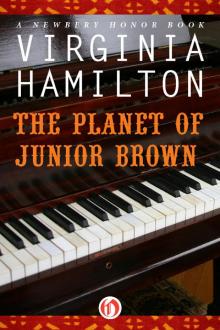 The Planet of Junior Brown
The Planet of Junior Brown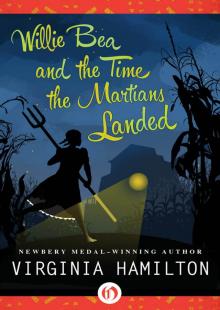 Willie Bea and the Time the Martians Landed
Willie Bea and the Time the Martians Landed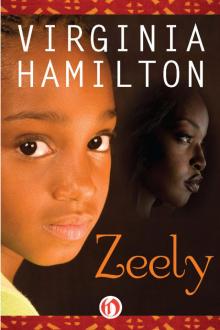 Zeely
Zeely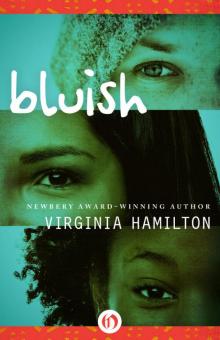 Bluish
Bluish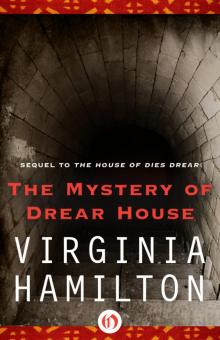 Mystery of Drear House
Mystery of Drear House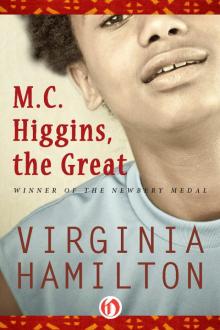 M.C. Higgins, the Great
M.C. Higgins, the Great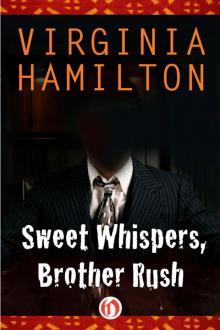 Sweet Whispers, Brother Rush
Sweet Whispers, Brother Rush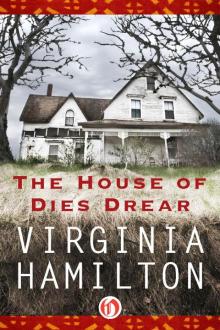 The House of Dies Drear
The House of Dies Drear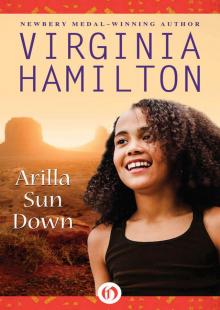 Arilla Sun Down
Arilla Sun Down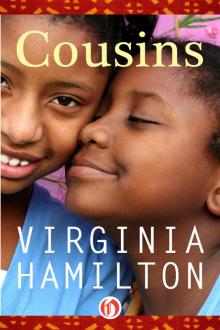 Cousins
Cousins